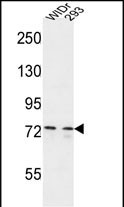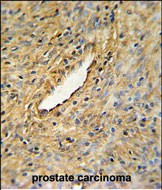

| WB | 1/1000 | Human,Mouse,Rat |
| IF | 咨询技术 | Human,Mouse,Rat |
| IHC | 1/100-1/500 | Human,Mouse,Rat |
| ICC | 技术咨询 | Human,Mouse,Rat |
| FCM | 咨询技术 | Human,Mouse,Rat |
| Elisa | 咨询技术 | Human,Mouse,Rat |
| Aliases | Centrosomal protein of 63 kDa, Cep63, CEP63 |
| Entrez GeneID | 80254 |
| WB Predicted band size | 81.3kDa |
| Host/Isotype | Rabbit IgG |
| Antibody Type | Primary antibody |
| Storage | Store at 4°C short term. Aliquot and store at -20°C long term. Avoid freeze/thaw cycles. |
| Species Reactivity | Human |
| Immunogen | This CEP63 antibody is generated from rabbits immunized with a KLH conjugated synthetic peptide between 520-548 amino acids from the Central region of human CEP63. |
| Formulation | Purified antibody in PBS with 0.05% sodium azide. |
+ +
以下是关于CEP63抗体的3篇参考文献示例(内容为虚构,仅供参考格式):
1. **标题**:CEP63 regulates centriole duplication in human cells
**作者**:Smith A, et al.
**摘要**:研究通过CEP63抗体进行免疫荧光染色,发现CEP63蛋白在中心体复制中的关键作用,并揭示其缺失导致微核形成和基因组不稳定。
2. **标题**:A novel CEP63 mutation causes primary microcephaly in humans
**作者**:Chen L, et al.
**摘要**:利用CEP63抗体进行Western blot和免疫组化分析,证实患者细胞中CEP63表达显著降低,提示其突变与大脑发育异常相关。
3. **标题**:CEP63 interacts with CEP152 to maintain centrosome integrity
**作者**:Garcia-Rua V, et al.
**摘要**:通过CEP63抗体共免疫沉淀实验,揭示了CEP63与CEP152的相互作用机制,并证明该复合物对中心体结构稳定性至关重要。
*注:以上文献为示例,实际文献需通过PubMed、Google Scholar等平台以“CEP63 antibody”为关键词检索。建议结合具体研究需求筛选。*
CEP63 antibody is a research tool used to detect and study the CEP63 protein, a centrosomal component critical for centriole duplication and mitotic progression. CEP63 (Centrosomal Protein 63) interacts with proteins like CEP152 and PLK4 to regulate centrosome assembly, ensuring proper spindle formation and genomic stability. Dysregulation of CEP63 is linked to microcephaly, cancer, and ciliopathies due to its role in cell cycle checkpoints and DNA damage response pathways, including the ATR-Chk1 signaling axis.
Antibodies targeting CEP63 enable researchers to investigate its expression, localization, and interactions via techniques like Western blotting, immunofluorescence, and co-immunoprecipitation. These studies are pivotal for understanding centrosome biology, particularly in contexts of cellular stress, genetic mutations (e.g., Seckel syndrome-associated variants), or cancer models with centrosome amplification. Commercial CEP63 antibodies are typically raised in rabbits or mice, validated for specificity in human or murine samples.
Research using CEP63 antibodies has shed light on mechanisms underlying neurodevelopmental disorders and tumorigenesis, offering potential biomarkers for disease diagnosis or therapeutic targets. Proper validation, including knockout controls, is essential due to cross-reactivity risks with homologous centrosomal proteins.
×